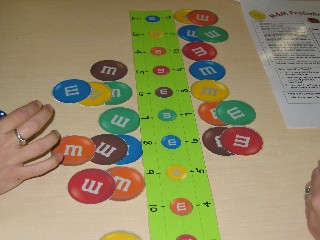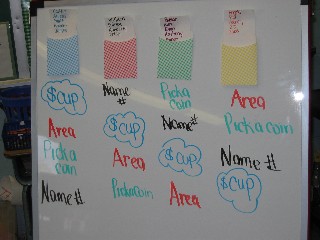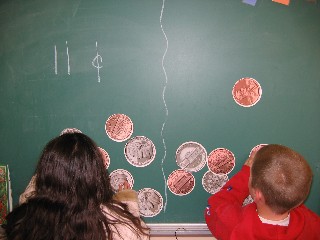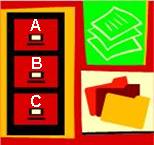
Game Day: Providing Differentiated Instruction & Practice
Game Day Components
|
Game Day PlanningMany teachers plan a weekly game day, using stations and rotating activities to best meet the varied needs of learners in their classrooms. One station is often the teacher, who is able to meet with small groups of students for remediation, enrichment, a quick assessment or to present problem-solving activities. This weekly session benefits all students who are actively involved playing games while the teacher meets with small groups. By carefully planning both the small groups and the rotation through activities, teachers may easily differentiate activities to provide additional practice or enrichment for students who have mastered the week's concepts and skills. Students enjoy being in control of their learning for the day and remain engaged throughout the allotted time. |

Students practice addition facts in the M&M game as they also learn firsthand about probability. There are many facts with the same sum. In this game, students quickly learn which sums they are more likely to toss in this two-dice game. Students are mastering basic facts and strategizing to produce the best outcome. It's a winning combination! |
|
Game days serve many purposes in the elementary math classroom:
|
||
Read more:Mathematical GamesProblem Solving ResourcesLogic Number ProblemsMath Enrichment TopicsBasic Facts FluencyIntervention StrategiesMath Manipulatives Resources |
Try it!The end of the year is a great time to try out this practice, if it is not a regular feature of your classroom. Package the games and materials for easy retrieval by students and use a whiteboard to create the rotation schedule and groups for the day. Quickly run through the activities and your expectations for student performance, then set the timer and let the groups get started. Use the time to meet with small groups you have identified as needing reteaching, guided practice or enrichment. Have students meet with you around a table, if possible, so it is easy for you to monitor individual student's work. Use team planning time to coordinate with your grade-level partners. This is an effective way to plan for this differentiated instruction and to maximize preparation time. Share the planning; share the wealth! A simple Game Day Group/Center Chart can be created on a whiteboard [see picture to left] using color-coding and pocket group charts to organize students and free up the teacher to work uninterrupted with small groups of students. Teachers often use a timer to signal a clean-up time of 1-2 minutes before groups move to the next center or station. |

Game Day Center/Group Chart lets students know with whom they'll be working and which centers they'll visit. |
Strategy of the Month: Set up a Math Game Center
Students always enjoy "playing games" in math class, feeling that they're getting away without working. Introduce games for practice of math facts, and then move them to the Math Game Center. Encourage students to play the games during transitional times, when work is done early or during indoor recess times. These activities are perfect end-of-the-year activities as they accommodate the changing schedules and absent students that characterize these closing weeks of school.
|
Games of the MonthThese games help students use a variety of skills and strategies to successfully play and win the games. Students who are fluent in their basic facts have a distinct advantage. Having students play in pairs increases mathematical thinking, strategizing and discussion. Add these games to your math center area and encourage students to play them when they are finished work or on Game Days. These games are an excellent resource for those end-of-the-year transitional times between assemblies, field days, etc.
|
Mathwire Search Options
New to Mathwire.com? There are several ways to search the site for activities by Math Standard, Math Topic, or using an alphabetical search.
See |
About Mathwire.comMathwire.com is designed to provide activities and appropriate worksheets for teachers to use in their classrooms. All activities and worksheets support the constructivist approach to learning mathematics and the NCTM Standards. Activities: The activities on this site were developed by Terry Kawas and the teachers in districts where she has worked as a math consultant and coach or with students she has taught in college math-methods courses. The activities are classroom-tested by teachers and appropriate modifications have been made to reflect this field-testing. These activities are posted online in an effort to share quality activities and routines within the mathematics community. Terms of Use: Teachers are welcome to download any of the activities for free use in their classrooms. No activities may be copied for use on other websites or included in commercial products without permission in writing from Terry Kawas, webmaster. Contact Terry Kawas |

